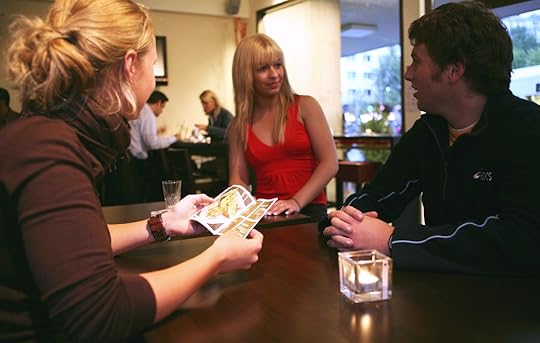Do You Apologize Too Much?
It was my first job.
Looking back, it wasn’t that big of a deal. I was greeting people at the door of a chain restaurant, asking a simple question, ushering them to their seats with the appropriate number of menus. But for me, at seventeen years old, this was me, becoming an adult.
This was the big bad world.
Actually, this was my neighborhood Applebees. But that’s beside the point.
I worked hard to be good at my job.
I learned quickly to seat the big parties in Tony’s section, because he loved to entertain, and to keep the two-tops for Michelle, because she liked to keep things low key. I learned never to seat Nicolas after 8:30pm, when the crowd started to die down, because he liked to go home early.
I learned Stephen was moody, and never to bother him when he was busy.
One day, I was cleaning tables in Brittany’s section.
This was beyond the scope of my responsibility but it was something I did for servers I liked. The faster her tables were clean, the more customers I could seat, and the more money that server would make.

Photo Credit: McTobi, Creative Commons
As soon as I was done cleaning, Brittany walked up the stairs I was trying to go down, to the point where we nearly bumped into each other.
With my hands full of dishes, I backed away so she could come through.
“I’m sorry,” I said.
And that’s when something happened that I’ll never forget.
She stopped, looked at me, and said, very seriously: “Don’t say you’re sorry. Say, ‘Excuse me, Brittany! I’m coming through!’”
At the time, I laughed nervously, but I’ve never forgotten that moment. I find myself saying “I’m sorry” often in my life. All the time, in fact. Not necessarily when I have something to be sorry for, but whenever I feel like I’m in the way.
Which I guess is a lot.
It makes me wonder: do I say I’m sorry too often?
Obviously, being able to say “I’m sorry” is really important, especially when you really have something to be sorry for. It can be one of the most diffusing things in a conflict; and also the mark of a great leader.
It takes a strong person to be able to take responsibility. 
But there’s a difference between a genuine apology and simply saying “I’m sorry” because we feel like we’re in the way. And what I noticed, after that day with Brittany, was that most of the time I said “I’m sorry,” I was doing it the second way.
I’ve always been afraid to take up too much space.
Scared to step in front of someone, to cut someone off, to raise my voice, to speak up at all, even when I have something to say. I’m scared to have an opinion (heaven forbid it be the wrong one) to start a conflict, to hurt feelings, to take up resources, to get in the way.
I’m scared to want things, to ask for things, to admit my hurting, to need help, to accept gifts, to make a path for myself.
I want to be the girl who says, “excuse me, coming through!”
But instead I’m the one who says, “I’m sorry,” and backs away.
It’s been more than ten years since I got that advice from Brittany, and I would love to say I’ve mastered it. I wish I never said “I’m sorry” when I didn’t mean it, or that I didn’t still worry I was stepping on toes or getting in the way.
But of course, none of that would be true.
What is true is that I think about Brittany’s advice all the time and I’m still working to be the kind of person who doesn’t feel the need to apologize for her existence.
And more than ever, lately, I find myself making room for myself, speaking my mind, asking for what I need and ultimately, like Brittany suggested, avoiding saying “I’m sorry” and instead insisting, “excuse me, I’m coming through!”
Donald Miller's Blog
- Donald Miller's profile
- 2745 followers



